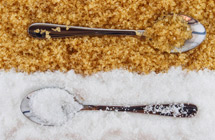不敢吃糖?科学家揭示人们对糖的8个误解
|
While eating too much sugar is directly associated with obesity and a host of heart and liver-related problems, there are plenty of myths out there with a host of misinformation that oftentimes makes eating even moderate amounts of sugar sound worse than it is. After all, we do need sugar to live. "We all need sugar — it's the basic building block of what runs our bodies, and, in fact, it's necessary," Dr. Jennifer Haythe, a cardiologist at Columbia Presbyterian Hospital in New York said. Keep scrolling to discover the truth behind some of the most common myths about sugar.
MYTH: Some types of sugar are better for you than others FACT: All "types" of sugar have the same effect on your body. "There’s this idea that there are different types of sugar, but that’s a myth," Dr. Haythe said. "Brown sugar, white sugar, honey... they are all ultimately broken down into the same thing: glucose. All forms of sugar are carbohydrates that can be used as glucose." MYTH: Sugar makes kids hyperactive FACT: There's no such thing as a sugar high. "The idea that sugar makes children hyperactive is one of the funniest myths about sugar out there," Dr. Haythe said. Various scientific studies over the years have determined that in fact there is zero direct connection between eating sugar and hyperactivity. MYTH: Sugar is as addictive as hard drugs
"There's no evidence that sugar can act as a gateway drug," Dr. Haythe said. "You can't get high from sugar, and there's no conclusive evidence that sugar is addictive." MYTH: Eating too much sugar causes diabetes
"Eating sugar does not cause diabetes; it’s a complicated problem involving your pancreas and metabolism," Dr. Haythe said. "When you have diabetes, you don't produce enough insulin. Insulin helps the glucose get absorbed into your bloodstream and liver as usable energy." You are more likely to develop diabetes if you are overweight or obese, because extra fat can lead to insulin resistance, according to the National Institute of Diabetes and Digestive Kidney Diseases. This makes a diet heavy in sugar an indirect, rather than a direct cause of type 2 diabetes. MYTH: Artificial sweeteners are better for you than sugar
Although artificial sweeteners like Stevia, Truvia, and aspartame (as found in diet sodas) have fewer calories than their sugary counterparts, research shows that participants who drink diet soda are twice as likely to be obese than those who do not. A study published in the National Library of Medicine found that saccharine — an artificial sweetener — is more addictive than cocaine. Another study published by the American Diabetes Association found that diet soda drinkers were 67 percent more likely to develop diabetes than non-diet soda drinkers. MYTH: Sugar causes cavities
"Sugar isn’t the cause of tooth decay; acid is," Dr. Mark Burhenne, of the online "Ask a Dentist" community, said. "The most cavity-causing food is crackers and breads, not candy. When you eat something with sugar, bacteria that naturally reside in your mouth consume this sugar as well. Bacteria’s waste product is acid, so after they have a meal, they excrete acid....Acid decalcifies or demineralizes tooth enamel by taking away its structure, creating decay." MYTH: You should eliminate all sugar from your diet
Of course, having too much sugar will lead to the problems we discussed above, like weight gain and long term health problems. But, glucose is essential to our body. "This idea that sugar is inherently bad for you is a myth," Dr. Haythe said. "We all need sugar; that's the basic block of what runs our bodies. It's necessary to survive. MYTH: Sugar is the root of all of your health problems
There's no doubt that sugar is a contributing factor to obesity. But it isn't the only thing to consider when trying to lead a healthy lifestyle. "Sugary foods happen to have lots of calories, and are usually heavily processed," Dr. Haythe said. "It's simple — if you eat a lot of calories, you'll gain weight and become unhealthy." |









